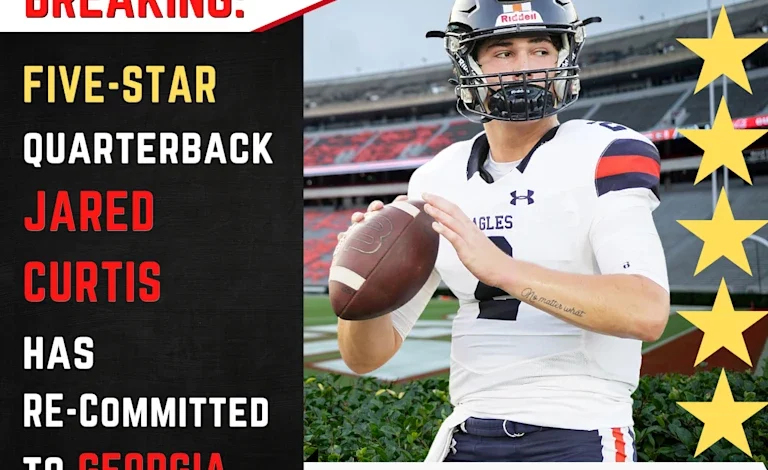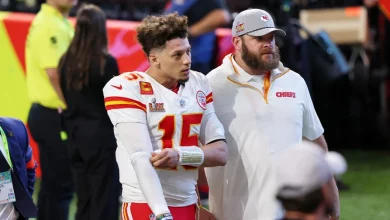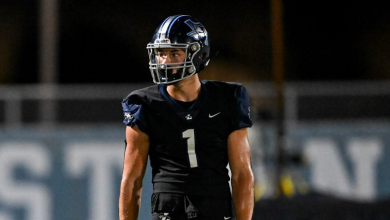Georgia will need things to be different wit 5-star QB Jared Curtis in new age of college football.

As the world of college football continues to evolve, programs that once thrived on traditional systems are being forced to adapt to new trends, especially in the quarterback position. In 2025, few programs are facing such an important crossroads as the University of Georgia, where the arrival of 5-star quarterback recruit Jared Curtis brings new hope, but also new challenges. Curtis is one of the most highly anticipated recruits in recent memory, a player who is expected to bring dynamic playmaking ability, a new offensive style, and a renewed sense of excitement to Georgia’s already elite program.
However, with this immense talent comes immense expectations—and significant changes. Curtis represents the new wave of quarterbacks that are reshaping the landscape of college football, where a more mobile, versatile, and high-tempo offense is becoming the norm. This transition is happening at a time when Georgia has been historically known for its strong defenses, powerful running games, and methodical offensive strategies under head coach Kirby Smart. The question remains: Will Georgia be able to adapt to this new era of football with a quarterback like Jared Curtis at the helm?
This article takes an in-depth look at the challenges and opportunities that lie ahead for Georgia with Jared Curtis, and why the program will need things to be different in this new age of college football.
Jared Curtis: A Game-Changing Talent
Before diving into Georgia’s need for change, it is crucial to understand what makes Jared Curtis such a special talent. Coming out of high school, Curtis was a consensus 5-star recruit and one of the top quarterbacks in the nation. His impressive combination of size, athleticism, and football IQ made him a standout in an era where dual-threat quarterbacks are increasingly in demand. Curtis is not only an excellent passer but also a dynamic runner, capable of extending plays and creating opportunities with his legs. His arm strength, accuracy, and ability to read defenses make him an ideal fit for a modernized offense that demands quick decision-making and versatility.
Curtis’s ability to thrive both inside and outside the pocket is exactly what makes him such a valuable asset in today’s college football landscape. As offenses evolve, teams are looking for quarterbacks who can make plays in a variety of ways. Curtis’s skill set perfectly aligns with this shift, allowing Georgia to potentially implement a more up-tempo and spread offense, compared to the more traditional pro-style offense that has long been associated with the Bulldogs under Smart.
For a program like Georgia, which has historically relied on its defense and ground game, bringing in a quarterback like Curtis could be a game-changer. He has the potential to lead Georgia to new heights, especially if the team can adapt its offensive philosophy to better fit his skill set. However, this transition will not come without its challenges.
The Changing Landscape of College Football
One of the most notable trends in college football over the past decade has been the evolution of offensive schemes. No longer are teams solely relying on pro-style offenses built around pocket passers and power running games. Instead, the focus has shifted to high-paced, spread offenses that utilize quarterbacks with dual-threat abilities, who can make plays with their legs as well as their arms. In fact, the most successful college football programs in recent years—such as Alabama, Clemson, and Ohio State—have embraced this style of play.
At the same time, the nature of the college football recruiting landscape has shifted dramatically with the advent of the Transfer Portal and NIL (Name, Image, Likeness). As a result, programs must be even more creative and adaptable in their approaches to roster building and strategy. The rapid changes in the game mean that what worked for Georgia’s past success may not necessarily work in the future. To compete at the highest level, Georgia needs to modernize its offensive identity, and that process starts with the quarterback.
A Transition Away from the Traditional Approach
For years, Georgia has been known for its defensive prowess and reliance on a strong, balanced offense. Under Kirby Smart, the Bulldogs have built a reputation for developing top-tier defenses, led by stars like Roquan Smith and Jalen Carter. The offensive strategy has largely been based on a traditional pro-style offense, where the running game plays a central role, and the quarterback is often asked to manage the game rather than take over. This system worked well for Georgia, especially in the years leading up to the Bulldogs’ national championship victory in 2021.
However, as the college football landscape has shifted, Georgia has found itself in a position where it must adapt to remain competitive. The rise of fast-paced, high-scoring offenses has made it clear that defenses alone may not be enough to win championships in the new era of college football. Teams like Alabama, LSU, and Oklahoma have proven that explosive offenses are just as critical as stout defenses. This is where the arrival of Jared Curtis could be a pivotal moment for Georgia’s future.
With Curtis now in the fold, Georgia will need to transition from its traditional offensive mindset to a more modern, quarterback-driven approach. While Georgia’s defense will likely remain elite under Smart, the Bulldogs will need to put more emphasis on developing a high-powered offense that can keep up with the changing dynamics of college football. This means utilizing Curtis’s dual-threat capabilities and maximizing his playmaking ability in a way that fits the new mold of successful offenses.
What Needs to Change for Georgia?
- Incorporating a More Dynamic Offense
The most obvious change that needs to occur is a shift toward a more dynamic, up-tempo offense. With Jared Curtis at the helm, Georgia will need to allow him the freedom to use his athleticism and playmaking ability to create big plays. This means incorporating more spread principles, up-tempo tempo, and an increased reliance on the passing game. Curtis has the ability to throw deep, make accurate short throws, and extend plays with his legs. Georgia will need to build an offensive system that plays to these strengths.
Furthermore, the Bulldogs need to be willing to adapt their traditional run-heavy approach. While the running back position is likely to remain a vital part of Georgia’s offense, utilizing a quarterback who can create opportunities with his legs opens up new possibilities. Curtis will likely be asked to make quick decisions in the read-option game, allowing him to make the most of the defense’s mistakes.
- Reevaluating the Offensive Line
One of the key factors in the success of any quarterback is the offensive line. With a quarterback like Jared Curtis, who can be mobile and make plays outside of the pocket, it’s even more important for the offensive line to be effective in both pass protection and run blocking. Georgia’s offensive line will need to be versatile, capable of both protecting the quarterback in traditional drop-back situations and allowing for quick-release plays in the spread offense.
The Bulldogs will also need to consider how their offensive line plays in the open field. Curtis will likely use more designed quarterback runs and scrambles, so Georgia’s offensive line will need to ensure that it can open up lanes for him to take advantage of when needed. This will require adjustments in both personnel and technique.
- Developing Playmakers at Wide Receiver
While Georgia has a strong tradition of developing elite running backs, the wide receiver position has historically been less of a focal point in their offense. However, with the arrival of Jared Curtis, the Bulldogs will need to put a greater emphasis on developing playmakers on the outside. Curtis will be at his best when he has talented wide receivers who can create separation and make plays after the catch.
For Georgia, this means investing in the development of their wide receiver corps and potentially bringing in new talent through recruiting or the Transfer Portal. A more explosive passing game will require a deeper pool of playmakers at the wide receiver position, as Curtis will need reliable targets to help him move the ball effectively through the air.
- Embracing the New Age of College Football
Finally, one of the biggest challenges Georgia will face in integrating Jared Curtis into their system is embracing the broader changes taking place in college football. With the proliferation of NIL deals, the impact of the Transfer Portal, and the increased emphasis on offense, Georgia will need to adapt its recruiting strategy and overall program philosophy to stay ahead of the curve.
This may mean placing a greater emphasis on speed and skill development over traditional size and strength, especially on the offensive side of the ball. The Bulldogs will need to build a culture that encourages innovation and creativity, rather than relying solely on the defensive-minded philosophies that have long defined their program.
Jared Curtis represents a new era of college football for Georgia—a time when explosive offenses, dynamic quarterbacks, and high-scoring games will be the norm. While Georgia has long been known for its defensive dominance, the arrival of Curtis signals the need for change. To stay competitive in the rapidly evolving landscape of college football, Georgia will need to reimagine its offensive identity, develop playmakers, and embrace the new wave of football that centers around versatile, mobile quarterbacks.
With the right adjustments, Jared Curtis has the potential to lead Georgia to even greater heights. If the Bulldogs can capitalize on his talents and evolve their offensive system to match the pace of modern college football, Georgia could soon find itself back at the top of the college football world—this time with a more potent, high-powered offense that complements their already elite defense.
The road ahead will not be easy, but with Jared Curtis under center, Georgia has a unique opportunity to redefine itself as one of the most complete and dynamic teams in college football.









